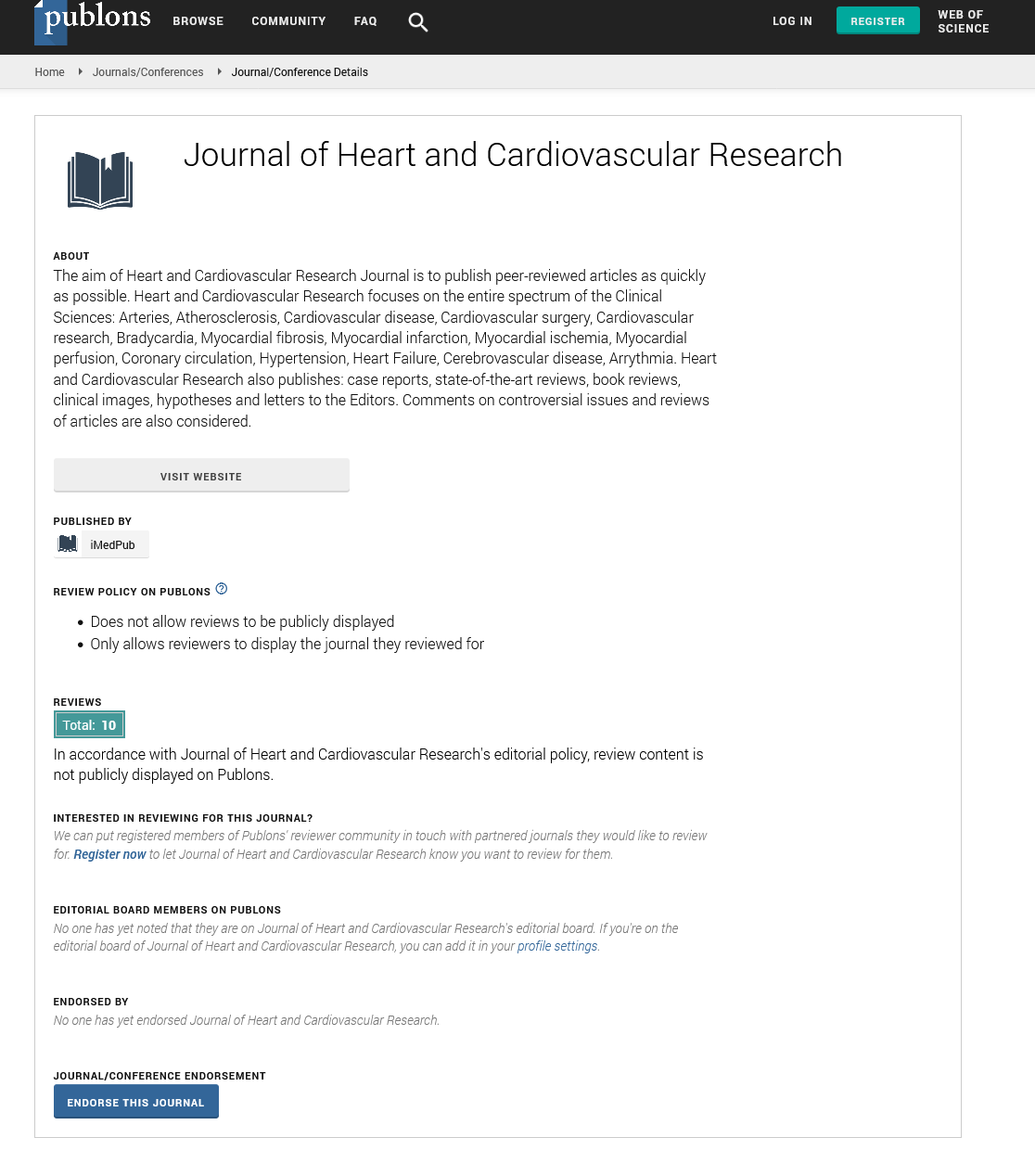ISSN : ISSN: 2576-1455
Journal of Heart and Cardiovascular Research
Abstract
Heart Congress 2019: Functional status, self-care and quality of life among patients with heart failure in Macau -Chio Hao- Kiang Wu Hospital
Background: Many studies reported that Heart Failure (HF) patients have poor self-care and quality of life. In Macau, there is no any research studying self-care behaviors, quality of life and functional capacity of HF patients and variables that influencing these aspects. Objective: The purpose of this study is to describe functional status, self-care, quality of life and the associated factors in a sample of HF Macau patients. Method: 74 ambulatory chronic HF patients who were hospitalized during the period of December 2016 to May 2018 were recruited in this descriptive cross-sectional study. Functional status was assessed by 6-Minute Walk Test (6MWT) and Left Ventricular Ejection Fraction (LVEF) and proBNP value. Self-care was evaluated by Self-Care of Heart Failure Index (SCHFI). Health-related quality of life was evaluated by Minnesota Living with Heart Failure Questionnaire (MLHFQ). Association analysis was performed to test the relationship among variables.The examination was a randomized controlled preliminary. Members determined to have cardiovascular breakdown were enrolled from two huge clinical focuses in northern Taiwan. Members were arbitrarily doled out to the intercession \ gatherings. Patients in the intercession bunch experienced a 12-week Baduanjin practice program, which included Baduanjin practice three times each week for 12 weeks at home, a 35-minute Baduanjin practice show video, an image based instructive pamphlet, and an exhibition record structure. The benchmark group got normal consideration and got no mediation. Weariness and personal satisfaction were evaluated utilizing an auxiliary poll at standard, a month, two months, and 12 weeks after the mediation Results: Participants had median age of 80 years (IQR=70-86) years and 52.7% were female. 24.3% participants were having heart failure of reduced ejection fraction (HFrEF). The median value of proBNP at admission was 3478.5 (IQR=1568.5-7133.8). The median distance of 6MWT was 190 m (IQR=109.8-279.4). The mean scores of self-care maintenance, management and confidence (subscales of SCHFI) were 51.1 (SD=16.9), 31.4 (SD=19.3) and 49.7 (SD=25.8) respectively, indicating inappropriate self-care (none of the subscales reached the cut point of 70). The mean scores of MLHFQ were 49.0 (SD=23.3), suggesting poor health-related quality of life. There were no relationships among SCHFI subscales, MLHFQ and 6MWT. MLHFQ was associated with age, working status, presence of symptoms of fatigue, anorexia and edema, number of co-morbidities and the use of diuretics. Conclusion: HF patients in Macau tend to have inadequate self-care, poor quality of life and fair functional status. Nursing interventions should target on these fields so to improve the health of HF patients.
Author(s): Chio Hao
Abstract | PDF
Share This Article
Google Scholar citation report
Citations : 34
Journal of Heart and Cardiovascular Research received 34 citations as per Google Scholar report
Journal of Heart and Cardiovascular Research peer review process verified at publons
Abstracted/Indexed in
- Google Scholar
- Sherpa Romeo
- China National Knowledge Infrastructure (CNKI)
- Publons
Open Access Journals
- Aquaculture & Veterinary Science
- Chemistry & Chemical Sciences
- Clinical Sciences
- Engineering
- General Science
- Genetics & Molecular Biology
- Health Care & Nursing
- Immunology & Microbiology
- Materials Science
- Mathematics & Physics
- Medical Sciences
- Neurology & Psychiatry
- Oncology & Cancer Science
- Pharmaceutical Sciences
